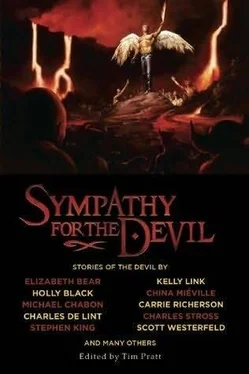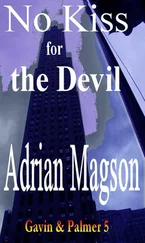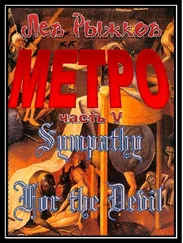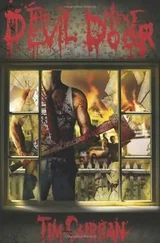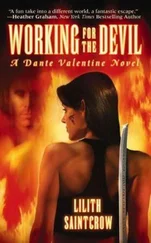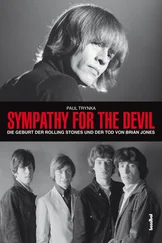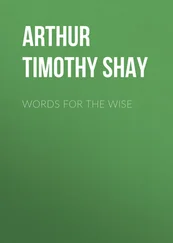Musa prostrated himself at Gil’s feet, burying his face in his hands. “No!” he cried. “Please! Please, sir-Gil-whatever you are-do not do this!”
“Musa, you have become complacent,” Gil said. “You have a special gift, a special connection to God. But it is too easy for you. You drive your truck and have visions and take it for granted that it is enough. But God requires more. Sometimes God requires sacrifice.”
Musa struggled to his feet, looked wildly around. “This isn’t what God wants! Don’t tell me God wants my only child martyred! To murder innocents along with the guilty, as the oppressors themselves do! Is that how the Prophet fought?”
“Musa,” said Gil, and in his voice was an ancient, ancient cold, with ten thousand years of emptiness behind it, “there is nothing you can do about that. Here is what you can do.”
Musa waited, watching Gil’s bottomless, glittering eyes.
“Write an amulet,” Gil said. “For the protection and redemption of your son’s soul. If you think he is going into sin-write an amulet to protect him.”
Musa wanted to protest more, to plead. But he found himself going to the cab of his truck and getting in, and taking his parchment and pens and ink out of the dashboard compartment. His tears mixed with the ink as he wrote the declaration of faith and he prayed, fervently, fervently. He no longer felt God’s grace in every grain of sand. He felt as though God’s grace was hidden at the end of a very long tunnel.
Gil came and took the amulet from him. “Thank you, Musa,” he said, and walked to his Jeep and got in.
Musa started his motor. He would rush to Cairo, too, and talk to Jamal. He would persuade him of the wrongness of his actions. He released the clutch and eased onto the road as the Jeep pulled out ahead of him.
But Jamal would not listen. Musa could hear his arguments now. How else to strike at the powerful oppressor, he would say, but the only way we can? Could Musa say for certain he was wrong? But not my son!, Musa’s heart shouted. God, God, not my only son! Jamal would look at him with contempt. Driver of sodas.
The road began a long, steep downgrade. Musa took his foot off the gas, lightly tapped the brake as he followed. The Jeep sped on ahead.
Jamal would not listen. He would be gone, and Musa’s life would be empty. If Jamal could only get through this period of youth and fiery blood, if he could only learn patience and humility, learn to trust God and endure injustice… but he would not have time. The briefcase in the Jeep ahead would see to that.
Help me, God, help me, Musa prayed, with all his heart.
Was it God? Or was it His Adversary? Or simply desperation? Something took Musa’s foot off the brake and slammed it down onto the gas and held it there.
The truck groaned and shuddered as it surged down the downgrade. It gained on the Jeep.
The distance closed.
Gil looked back over his shoulder, and in that instant Musa realized he loved the King of the Jinn as a dog loves his master, and he slammed on the brake. But the inertia of a ton of Pepsi would not entertain such indecision. The wheels of the cab locked and skidded, the trailer behind slammed it forward, and the nose of the semi smashed into the Jeep, flipping it into the air. Musa was thrown into the wheel; his jaw snapped and blood fountained across the windshield. He felt the truck fishtail off the road, and then roll; he heard the sound of ten thousand shattering Pepsi bottles fill the desert.
Then it stopped.
Then came the sound of ten thousand bottles slowly reassembling themselves.
The droplets of blood swam slowly back through the air into Musa’s veins.
The glass of the windshield reassembled, each piece flying silently, gracefully, back to meet its brothers, glinting in the sunlight. Behind them, the sky rolled back to its proper place above Musa.
The Jeep swung down out of the sky, kissed the cab of the truck, and moved forward onto the road. The trailer of the rig drew back and the cab settled down. Musa’s foot left the brake and landed on the gas.
Musa had never known what a gift the gentle movement of time was, the succession of each moment in its turn, each moment a wide open field of freedom and of choice. He felt his heart beat backwards, his breath move backwards through his lungs. He wanted to shout, to cry, to escape the cab, but he could not: his limbs moved in their predetermined course as the Jeep and the truck crept backwards up the hill. Slowly, time dragged its Musa puppet back through the seconds, until he was in his cab parked at the side of the road handing the amulet to Gil. Then it released him.
Gil gasped and spat into the sand. He was shaking. So was Musa. The King of the Jinn looked up at him with a wild, feral grin.
Musa gripped the wheel, his heart exploding in terror.
“You surprised me, Musa,” Gil said. “I’m amazed. It’s been a very long time since any of my collection surprised me.” He looked out over the desert horizon. “I think I’ve had you on too loose a leash. Your talents make you too hard to control.”
Musa watched this King of the Djinn in silent terror. This creature who played with time as a child plays with dolls. Was this Satan himself?
Gil glanced back and saw Musa’s face, and for a moment the chill, benign mask of the King of the Djinn slipped, and Musa saw what was under it: desperate rage. Then Gil smiled coolly again.
“You’re a fool, Musa. I’m not Time’s master. I’m its victim.”
He looked down at the amulet and stroked it once, gently. Then he slipped it into his pocket.
He threw the briefcase into the Jeep but did not get in. He stood and watched Musa. “Well,” he said finally, “There’s nothing you can do to save Jamal. And you won’t see me again. So all your earthly attachments are gone now, Musa. You’re free to find God.” Gil pointed out into the empty desert. “He’s that way.”
Musa looked in the direction the Djinn had pointed.
God’s presence was everywhere, in every grain of sand. It was the same huge, infinite, bountiful light.
But how could he have misjudged it before, to think it gentle? It was alien, inhuman, immense beyond reason. If every human was burned alive, if every creature on earth was swallowed in the fire, the Divine Presence would not blink.
Musa began to walk.
He walked until his throat was dry and his breathing shallow. Then, after a while, he was crawling. It was only a spiritual exercise.
The sand was hot against his cheek.
The Sahara was a vast white page, and Musa’s body one tiny, bent black letter written on it. Seen from above, seen from very far away.
Summon ,Bind ,Banish by Nick Mamatas
Alick, in Egypt, with his wife, Rose. Nineteen aught-four. White-kneed tourists. Rose, several days into their trip, starts acting oddly, imperiously. She has always wanted to travel, but Alick’s Egypt is not the one she cares for. She prefers the Sphinx from the outside, tea under tents, tourist guides who haggle on her behalf for dates and carpeting. She wanted to take a trip on a barge down the Nile, but there weren’t any. At night, she spreads for Alick, or sometimes takes to her belly, and lets him slam and grind till dawn. Mother was wrong. There is no need to think of the Empire, or the men in novels. There’s Alick’s wheezing in her ear, the thick musk of an animal inside the man, and waves of pleasure that stretch a moment into an aeon. But she doesn’t sleep well because the Egypt morning is too hot.
A ritual Alick performs fails. The ambience of Great Pyramid cannot help but inspire, but the shuffling travelers and their boorish gawking profanes the sacred. The sylphs he promised to show his wife-“This time, it will work, Rose. I can feel it,” Alick had said, his voice gravel-do not appear. But Rose enters a trance and stays there, smiling slightly and not sweating even under the brassy noon sky for the rest of the trip.
Читать дальше
